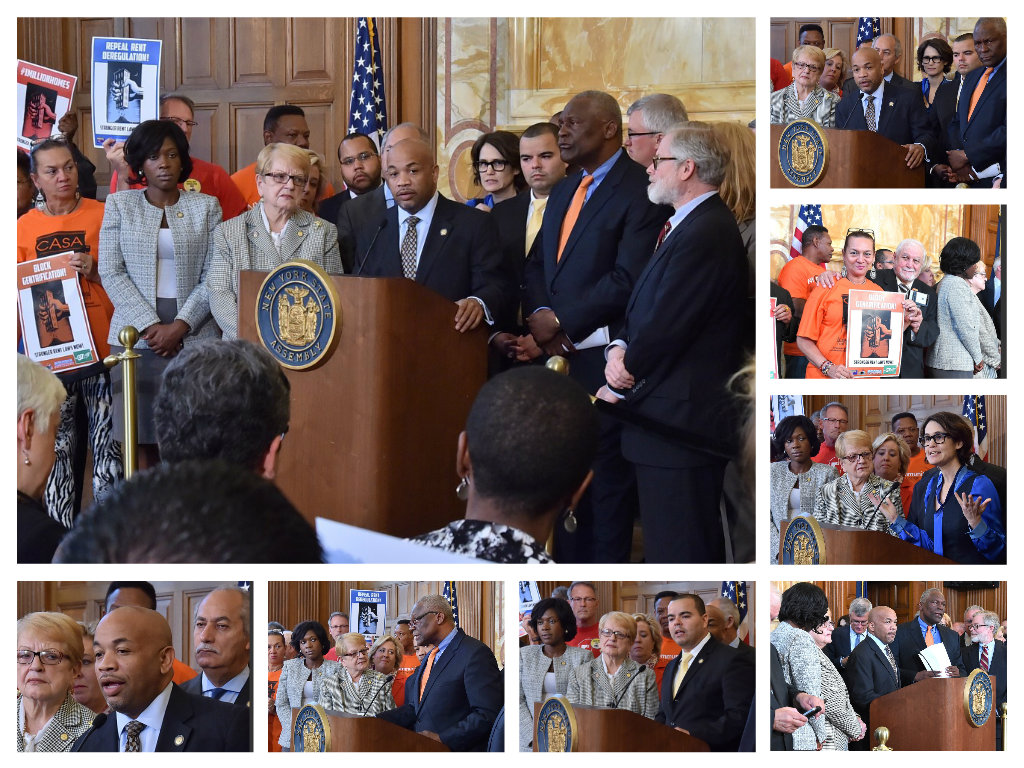
Assembly Legislation Strengthens Rent Regulations,
Protects Tenants
'); // else // echo("
"We must secure the place of working families in New York. They are the fabric of our communities and have long been the foundation upon which our state is built," said Speaker Heastie. "For too long we have seen ever increasing rents and stagnant wages driving these families from neighborhoods they shaped. We must stand against the continued harassment that families face and provide our communities with stable homes."
"As a resident of the same rent-stabilized apartment in which I grew up, I know firsthand how important affordable housing is to New York's continued success," said Assemblyman Wright. "By providing stronger rent laws and strengthening protections for residents, we can keep countless New Yorkers in their homes with the knowledge that their rights are secure."
The legislation would strengthen existing rent regulations with the aim of maintaining affordable housing in New York State. Its provisions include: prohibiting owners from adjusting preferential rent upon lease renewal, repealing vacancy decontrol, and establishing that rental increases associated with major capital improvements (MCIs) and individual apartment improvements (IAIs) be separately designated and billed as surcharges, and must cease when the cost of the MCI or IAI has been recovered.
In addition, the legislation would establish the crime of second-degree harassment of a rent-regulated tenant when an owner intentionally makes housing uninhabitable, unsafe, or unhealthy, and causes a tenant to vacate. The civil penalties for tenant harassment would also increase. A violation of an order of the Department of Homes and Community Renewal (DHCR) would result in a penalty between $1,000 and $2,000 for the first offense, rising to between $2,000 and $4,000 for each subsequent offense. Harassment of a tenant to cause the tenant to vacate would result in a penalty between $2,000 and $5,000 for a first offense, rising to between $10,000 and $15,000 for each subsequent offense or for a violation targeted at more than one tenant.
The legislation would also:
- extend rent regulation provisions and general business law provisions pertaining to cooperative and condominium conversions from June 15, 2015 to June 15, 2019;
- permit a landlord to recover only one housing accommodation as a primary residence for either his or her own personal use and occupancy, or for the use and occupancy of his or her immediate family. Such a recovery would be prohibited if a tenant has occupied an apartment for 15 or more years;
- reduce the amount by rent may be increased upon vacancy, from 20% to 7.5%;
- include former federal project-based Section 8 buildings whose contracts are no longer in effect and Mitchell-Lama buildings that dissolve after the bill become law in the category of housing covered by rent regulation laws, regardless of when the building was occupied;
- allow existing loft units that were included in the 2010 expansion to be brought into compliance with building and fire safety standards;
- make tenant protections for loft tenants permanent. These include reducing rental increases, allowing cases by case determination on incompatible uses, and allowing smaller loft units to be covered;
- expand the ownership period for an owner to be eligible for an alternative hardship exemption, from three years to six;
- require an owner or landlord to provide a prospective tenant with documentation to support any allowable increases in the legal regulated rent during the previous four years; and
- require that the DHCR cap the percentage rent increase available to owners of rent controlled apartments at a rate equal to the average of the last five years of adjustments by the Rent Guidelines Board for one-year renewal leases.
